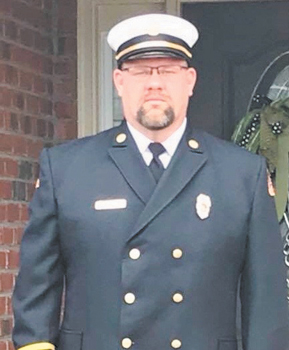 In his role as emergency management director and fire marshal for Hoke County, Bryan Marley spends his typical work days in front of a computer dealing with planning and coordinating emergency-related matters.
In his role as emergency management director and fire marshal for Hoke County, Bryan Marley spends his typical work days in front of a computer dealing with planning and coordinating emergency-related matters.
But as a career firefighter who has worked in close proximity with fellow fireman and other first responders, the member of the Hope Mills Board of Commissioners appreciates the challenges his peers in the field are facing now as they cope with the COVID-19 pandemic while serving in frontline roles.
“You don’t know what’s happening day to day,’’ he said. “Stuff changes. Numbers fluctuate. You get executive orders handed down.’’
The biggest problem for rescue workers in the field is the nationwide shortage of what’s called PPE, personal protective equipment.
“Nobody can get their hands on masks, gloves and gowns,’’ Marley said. “You call your suppliers and they don’t have it and don’t know when they will be able to get it. Everybody is sold out of everything. It’s a crazy time.’’
With protective gear in short supply, Marley said first responders have been forced to reuse what used to be disposable items, learning how to disinfect masks and gloves so they can be worn in multiple situations.
In some cases, first responders may resort to unusual alternatives, like punching armholes in large garbage bags and using them as gowns, or wearing coffee filters as breathing masks.
While this may not be perfect, Marley compared it to the difference between eating a steak sandwich versus a bologna sandwich.
“When you’re hungry, a bologna sandwich is like a steak sandwich,’’ he said.
Concerns over COVID-19 have changed the way fire departments are handling emergency calls these days. There was a time when a fire truck routinely accompanied paramedic rescue vehicles on calls. Because of the virus, calls are handled differently now and fire trucks often don’t respond.
When someone calls 911, Marley said, the dispatcher asks a series of questions. If the caller replies yes to them, they meet the protocol for a COVID-19 response and the fire truck won’t be dispatched on the call.
Marley said this is to prevent the amount of people exposed to someone who may be infected with COVID-19. The dispatcher will also warn the paramedics going out on the call that they need to take all necessary precautions for working with someone who may be carrying COVID-19.
But as big a challenge as dealing with the virus directly is, Marley said that’s only part of he problem for first responders. “You listen to this stuff all day long, then you go home and everything is closed down,’’ Marley said. “You can’t go anywhere or do anything.
“Everything you used to do to relieve your stress levels when you get off, you can’t do. You’re cooped up at the house.’’
There’s also the anguish of loading a COVID-19 patient onto the ambulance and watching them say goodbye to their family, who can’t even go to the hospital to be with them and could be saying goodbye to that person for the last time.
“Stuff like that weighs on you after awhile,’’ Marley said.
Marley’s advice to everyone is to follow the orders of Gov. Roy Cooper and stay home as much as possible. “Limit where you go and what you do, and we’ll get through this thing a whole lot quicker,’’ he said.
“Listen to what the experts say.’’
Home
Marley says COVID-19 huge challenge for first responders
- Details
- Written by Earl Vaughan Jr.